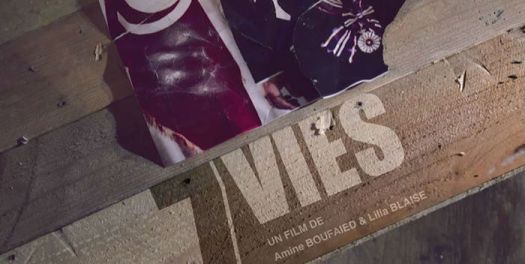Even though Nejib Belkadhi‘s last feature got out a couple of weeks ago, I went to see it for the first time yesterday. The projection was followed by a debate, therefore this review will discuss both documentary and the Q&A.
 We are getting closer to the elections, and 7½ came out now for a reason, or so it was implied. One hour and twenty minutes of film, more than the usual format of a traditional documentary, and like highlighted by the director, it is more of a fiction format, and what I would add is that he shaped it also like a fiction.
We are getting closer to the elections, and 7½ came out now for a reason, or so it was implied. One hour and twenty minutes of film, more than the usual format of a traditional documentary, and like highlighted by the director, it is more of a fiction format, and what I would add is that he shaped it also like a fiction.
Shot between January and October 2011, from the climax of the Tunisian revolution to the elections, 7½ follows a sample of parties, and their correspondant leaders and/or members; Beji Caid El Sebsi, Moncef Marzouki, Slim Riahi etc. Taking the spectator and giving him a “back to the past experience” a little reminder; what was said back then, what has been applied until today.
I laughed, and I wasn’t the only one, but that’s all I did.
When you go watch a documentary that tackles political issues, and facts just before important elections, either you want to admit it or not, you want to see things that will enlighten you, that will help you organize your thoughts one way or another and yes, you might also want to relax, and play down the whole thing. Though, in Nejib Bekhadhi’s doc, yes you laugh, you criticize the personalities you’re seeing and their sayings and once you arrived at the credits, what did you retained from all that? What the documentary added to what you already known? Or what can be found in Youtube today? This is what I will cruelly criticize about 7½; this lack of guidance and artistic activism.
The director said that he wanted to show something totally objective, just stating the facts, revive Tunisians’ memory, but, once you’ve decided to make your audience laugh, you also decided to show particular situations, make your speakers risible, farcical, then you got yourself a subjectivity.
That is when the role of the questions posed is here crucial; indeed, the only questions we hear, were the ones made to win a laughter from the spectators, therefore when Belkadhi himself asked Slim Riahi what he thought a party was, and that the answer took a while to come but then was “to make politics” you laugh, because it is ridiculous, and meant to be.
The director’s goal was to ridicule all those big heads, and whether you like it or not, it is subjective. The questions are subjective, well constructed and studied to provoke some wanted reactions.
Nejib Belkadhi also said that his aim wasn’t to influence any one and didn’t want to make a serious documentary about politics (probably because the Tunisian politics is a joke), however, again, when he put down the pants of his political figures, it is discrediting them, it is saying implicitly though “don’t vote for them, they are either liars or incompetent politically speaking”. He made the job of caricaturists.
7½ is entertainment. The lack of artistic activism is reducing the documentary to simply entertainment. Plus, it isn’t targeting the mass, it is targeting a particular audience.
Tunisians (and even foreigners), if you really want to relax and laugh, yes, go watch 7½, but if you want to think, go watch Hamza Ouni’s El Gort, which is clearly to me, the best doc made until now about the revolution and the outcomes of it.

